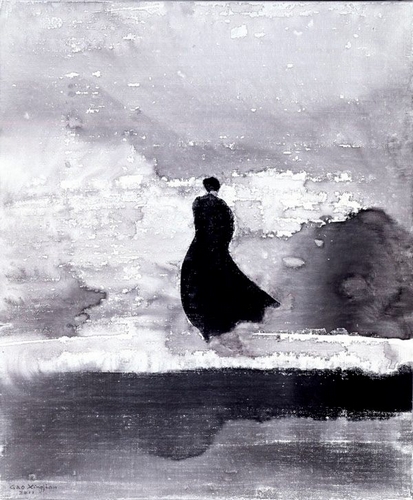
Dona surant - Gao Xing Jian
Presenting the song recitals at the Schubertiade Vilabertran is becoming a tradition here on Liederabend. The festival's schedule rules our postings and this year, four out of five recitals will take place during the same week (and what a great week that will be!), so we'll devote only three posts to them. Today's post is about the opening recital, on August 17, with Ilker Arcayürek and Wolfram Rieger; Next weeks’ will be on recitals by Matthias Goerne and Alexander Schmalcz and Sarah Connolly and Malcolm Martineau and the third one will be on recitals by Kate Royal and Christoph Prégardien, both again with Malcolm Martineau. As always, they will be short posts where I'll go over the songs we have already heard and suggest a new one.
In February, when I presented the festival, I told you that if someone asked me: "Why Schubert?" my answer would be addressing he or she to Ilker Arkayürek and Wolfram Rieger's recital. The young tenor has prepared a wonderful program, entirely devoted to the apple of my eyes; the songs are very representative, among other reasons because half of them are from those two poets that Schubert more often musicalized, Goethe and Mayrhofer. So far, we’ve heard many of the songs included in this concert, so I’d better begin with them.
In February, when I presented the festival, I told you that if someone asked me: "Why Schubert?" my answer would be addressing he or she to Ilker Arkayürek and Wolfram Rieger's recital. The young tenor has prepared a wonderful program, entirely devoted to the apple of my eyes; the songs are very representative, among other reasons because half of them are from those two poets that Schubert more often musicalized, Goethe and Mayrhofer. So far, we’ve heard many of the songs included in this concert, so I’d better begin with them.
- We listened to Lied eines Schiffers an die Dioskuren in one of the two posts I talked about Schubert's friends. I chose it because it was related to two of them: Johann Mayrhofer, who wrote the poem, and Johann Michael Vogl, the famous baritone, according to himself, the composer’s "first admirer". We heard that song performed by Fritz Wunderlich and Hubert Giesen.
- Also from a Mayrhofer's poem, Abendstern, the sixth reason (performed by Anthony Rolfe-Johnson and Graham Johnson) that I offered to love Schubert.
- The third Lied with a poem by Mayrhofer is Nachtstück, which we heard in the magnificent (and abridged) version of Fritz Wunderlich and Hubert Giesen.
- From Goethe, the poem with more songs in Schubert's catalog, we heard three Lieder included in Arcayürek's recital. The first one is the great Rastlose Liebe, performed by Nicolai Gedda and Erik Werba.
- Der Musensohn is a Lied that, as I told you when I spoke about it, is a celebration of music and life; There are few other songs by Schubert so optimistic and happy. Again I chose the version by Fritz Wunderlich and Hubert Giesen, it was one of the posts I dedicated to the tenor.
- The third and last Lied with a poem by Goethe that we're retaking is Wer nie sein Brot mit Tränen ass, one of the songs from Wilhelm Meister's Apprenticeship Years, which we heard performed by Simon Keenlyside and Julius Drake.
- And we’ve reached the last three songs. Der Jüngling an der Quelle is a deliightful and delicate miniature, a gorgeous song with a poem by Johann Gaundenz von Salis-Seewis that we heard performed by Jonas Kaufmann and Helmut Deutsch.
- Another delightful song, An den Mond, D. 193, one of the many songs with a moon by Schubert; this one has a poem by Ludwig Hölty's and we listened to Ian Bostridge and Julius Drake.
- And the last song is Der Einsame, serene, charming, wonderful song. Our version was that of Hermann Prey and Karl Engel and I shared with you when I talked about the SV17 programme.
The musical illustration of today’s post will be Die Liebe hat gelogen (Love has lied), one of the two Lieder that Schubert wrote with poems by August von Platen, in March or April 1822. It is an emotionally intense and at the same time, sober song; the piano accompaniment reminds us a funeral march and the vocal line moves in a very narrow range. Schubert added to the poem, in two verses, the repetition of the first one, so that after the shocking last verse, Du armes Herz, lass ab, (Cease, my heart, cease), we return to the serene sadness of the beginning. We will listen to Die Liebe hat gelogen in the version of Florian Boesch and Malcolm Martineau.
Die Liebe hat gelogen
Die Liebe hat gelogen,
Die Sorge lastet schwer,
Betrogen, ach, betrogen
Hat alles mich umher!
Es fliessen heisse Tropfen
Die Wange stets herab,
Lass ab, mein Herz, zu klopfen,
Du armes Herz, lass ab.
Die Sorge lastet schwer,
Betrogen, ach, betrogen
Hat alles mich umher!
Es fliessen heisse Tropfen
Die Wange stets herab,
Lass ab, mein Herz, zu klopfen,
Du armes Herz, lass ab.
Love has lied,
Worries burden me heavily;
I am deceived, alas! deceived
By everything around me!
Bright tears run
Down my cheeks;
Cease, cease your beating,
Cease, my heart, cease!














Comments powered by CComment